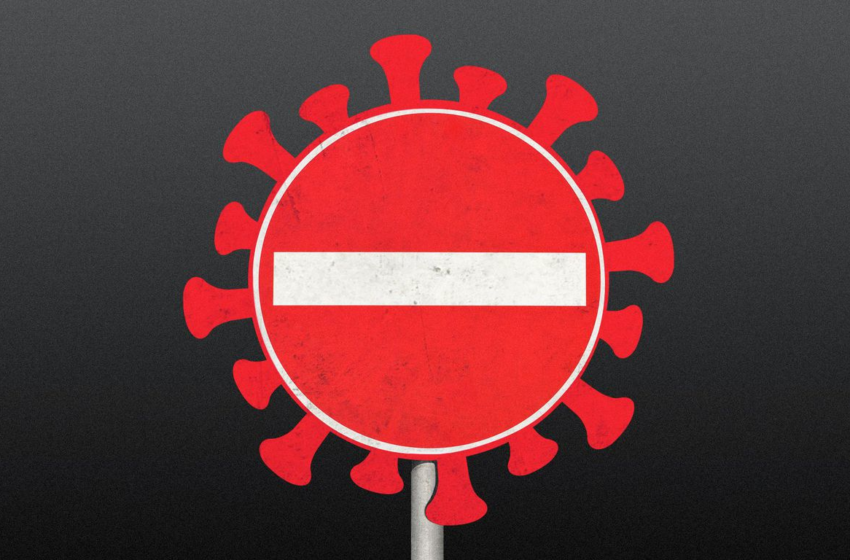The travel bans and border closures prompted by the Omicron variant likely won’t fully prevent its spread, but that won’t stop countries from leaning on the measures.
Why it matters: The rapid speed at which countries turned to travel bans with the emergence of Omicron indicates border controls will increasingly become a weapon against infectious disease — whether or not public health experts agree they are effective.
Where it stands: 56 countries were reportedly implementing travel measures as of Nov. 28 in response to the Omicron variant, the World Health Organization reported on Tuesday.
- That includes the U.S., which banned travel from South Africa — where the variant was first identified — and seven other countries in southern Africa.
- Other countries have gone further, with Japan and Israel banning all foreigners from entering their borders.
What they’re saying: It’s long been gospel among public health experts that targeted travel bans are unjust and largely counterproductive, which was one reason why the WHO did not recommend travel restrictions when COVID-19 was first declared a public health emergency in 2020.
- Dutch health authorities announced on Tuesday they had found Omicron in virus samples dating from Nov. 19 and 23, days before South Africa first identified the variant, indicating it was already spreading in western Europe.
- Despite the U.S. travel ban, the first known U.S. Omicron case was detected in California on Wednesday.
- “Putting in place travel bans that target Africa attacks global solidarity,” the WHO’s regional director for Africa, Matshidiso Moeti, said on Nov. 28. “COVID-19 constantly exploits our divisions. We will only get the better of the virus if we work together for solutions.”
Yes, but: The full story on travel controls is more mixed, and there is evidence that reducing the pace of international travel can at least slow the spread of a new variant — which matters at a moment when scientists still need time to understand the full extent of the Omicron threat.
- A study published earlier this year found international travel measures put in place early in the pandemic were able to slow the initial export of cases outside of China.
- “Travel bans, when you have a highly transmissible virus, never completely … prevent it from coming into the country,” Anthony Fauci told ABC’s “This Week” on Sunday. “But what you can do is you can delay it enough to get us better prepared.”
Between the lines: Truly restrictive travel controls can all but extinguish even a virus as contagious as SARS-CoV-2.
- The countries that have most effectively minimized COVID-19 cases — like Australia, New Zealand, Japan and China — have gone well beyond targeted travel bans to near full border closures.
- Scientists in China touted a study over the weekend claiming the country could be facing more than 630,000 COVID-19 infections per day if it dropped its zero-tolerance travel controls.
- But those controls have come with severe economic and social costs, and the longer the pandemic goes on, the harder it can be to maintain those measures.
The big picture: The effectiveness of travel bans may be secondary to the fact that they are a tool that governments can put in place — and just as importantly, be seen to put in place — relatively easily. Once they’ve been deployed, they can and will be deployed again.
- Leaders may struggle to get their citizens to vaccinate or take other measures, but borders are one area where they still maintain control.
- Fewer than one-third of Americans traveled outside the country before the pandemic, underscoring why travel bans are a relatively easy political lift — most people aren’t directly affected by them.
What to watch: What really matters with the Omicron travel bans is what countries do once scientists have determined just how much of a danger the new variant poses.
- Should Omicron turn out to be less dangerous than the existing Delta variant, there should be no reason to continue targeted bans.
- But one lesson of COVID-era travel controls is that they tend to be much harder to lift than they are to impose — it took more than 16 months before the U.S.-Canada land border fully reopened to vaccinated travelers.
- And unlike at the start of the COVID-19 pandemic, countries now have more selective tools to screen all visitors with tests — a move the Biden administration is reportedly considering — which could allow safer travel.
The bottom line: We’re entering a future where governments will be much quicker to turn to travel controls in the face of infectious disease — so get that fully refundable ticket.











